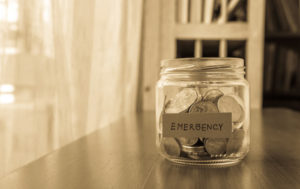This is a guest post from Katrina Manning, Editor-in-Chief for Techandburgers.com, and please note that some of the content may be more relevant to US readers. This article does not constitute financial advice and is for informational purposes only.
 Most people understand how critical it is to save money for an emergency savings fund. But, when it comes to thinking about the amount of money needed, many decide to spend it on something else instead.
Most people understand how critical it is to save money for an emergency savings fund. But, when it comes to thinking about the amount of money needed, many decide to spend it on something else instead.
Unfortunately, you can never tell when your car may break down or you need to carry out emergency repairs around the home. That last thing you want to have to do is decide whether or not you can pay your electricity bill. In addition, having an emergency fund is the foundation and building block for financial peace and security. Here, we’ll take a look at various strategies in order to your emergency savings fund on the right track.
Why you should save for emergencies
The most important reason for having an emergency savings fund is so that you don’t have to get into debt. Using your credit card to pay for an emergency only pushes financial prosperity further down the road. With an emergency savings fund, you don’t have to rely on credit. Moreover, if you are living paycheck-to-paycheck, you may have instances where you fall behind on bills.
As a result, you will incur late fees and that make your bills even larger. The late fees can be the difference between a weekend on the town or being stuck at home with nothing to do. An emergency savings fund means you won’t have to worry too much about late fees. Not to mention, if you have a fund that is the equivalent of one month’s living expenses, you can get ahead on your bill–which gives you more peace of mind.
Starting your emergency savings fund
It’s not the easiest thing to save money, especially if you have plans for how you would like to spend your money. Yet, once you start, it will soon become addictive. The good news is it doesn’t have to be all or nothing; you can start small. It doesn’t matter how much you have to save what matters most is getting started. Even if you can only save £20 from each paycheck or from your monthly structured settlement payout, that is better than saving nothing. Soon, you’ll start to see your fund grow, which will motivate you to continue saving.
Set up payroll deductions
If you find it too difficult to save on your own, you might consider an automatic payroll deduction. This is where you have a specified amount deducted directly from your paycheck before it is deposited into your checking account.
Ask for a credit card rate reduction
If you currently have a credit card balance, you should start looking for ways to get a rate reduction. One way is to call your card’s toll free number, ask for a supervisor and request a rate reduction. It also helps to tell them that you’re thinking about transferring your balance off the card.
Cut your electricity bill with a programmable thermostat
Another way to add more money to your emergency savings fund is through setting your air conditioner/heater to turn off when you are sleeping or at work. This way, energy isn’t wasted and you can cut your cooling or heating bill by 20 or 30 percent, according to the experts of AC installation Santa Rosa.
Think of it as a bill
When you receive your paycheck, you already know how much you need to spend on your bills such as rent, car insurance and groceries. Depending on how much left you have to spend, you may think your emergency savings fund can wait. However, if you treat it as a bill, you can pay into it at the same time as you do your other bills without thinking.
Use public transportation
Most metropolitan areas have convenient public transportation services. This means that firstly, you won’t have to worry about driving. Secondly, you’ll also get some fresh air. Thirdly, public transportation is a lot less expensive than a car payment, car insurance and fuel costs. You can then use your savings for your emergency savings fund.
Once you start saving, you may never quit. The first goal is to start and keep your expectations low. As soon as you realise that it wasn’t as difficult as you thought it was, you might even save enough to cover a year’s worth of expenses.